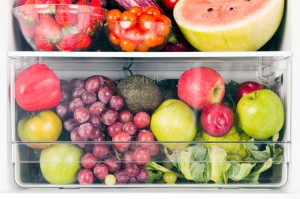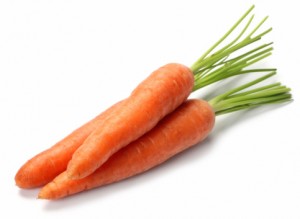The ABCs of Storing Fruits and Veggies in Your Kitchen
 Is there anything more frustrating than finding the fruits and veggies you just purchased a few days ago all moldy, dried out, or mushy—all before you’ve even gotten to eat them? We’ve all been there, and yes, it’s quite the bummer.
Is there anything more frustrating than finding the fruits and veggies you just purchased a few days ago all moldy, dried out, or mushy—all before you’ve even gotten to eat them? We’ve all been there, and yes, it’s quite the bummer.
The truth is, no fruit or veggie is the same, so just storing everything that grows from the earth in the fridge is actually not always a foolproof way to keep things fresh. Some produce needs to be kept dry, while others need to be kept damp; some need to be stored at room temperature, while others need the cold to thrive. And yeah, sometimes it can get a bit confusing… which is exactly why we’ve created this handy guide just for you!
From A(pples) to Z(ucchini), we’ve got the ABCs of how to properly store fruits and vegetables in your kitchen.
Avocados: Place in a paper bag at room temp. To speed up their ripening‐ place an apple in the bag with them.
Basil: Basil does not like to be cold or wet. Store in an airtight container or jar loosely packed with a small damp piece of paper towel and leave on a cool counter.
Carrots: Snip the tops off to keep them fresh longer. Place them in closed container with plenty of moisture, either wrapped in a damp towel or dunk them in cold water every couple of days if they’re stored that long.
Celery: Place in a bowl of shallow water on the counter. If you want to keep it in the refrigerator, wrap it in tin foil.
Corn: Leave un-husked in an open container.
Cucumber: Wrap in a moist towel in the fridge.
Garlic: Store in a cool, dark place.
Green beans: Store with a damp cloth draped over an open or loosely closed container.
Herbs: Store in a closed container in the fridge to be kept up to a week. Any longer might attract mold.
Onion: Store in a cool, dark and dry place with good air circulation.
Peppers: Store in a plastic bag before placing in refrigerator.
Spinach: Store loose in an open container in the fridge.
Tomatoes: Never refrigerate. Tomatoes can stay for up to two weeks on the counter.
Zucchini: Leave out on a cool counter, even after cut. Wrap in a cloth and refrigerate for longer storage.
Cherries: Store in an airtight container.
Bananas: Take bananas apart when you get home from the store. Keep them on the counter.
Citrus: Store in a cool, ventilated area.
Berries:Store in a paper bag and only wash before you plan on eating them.
Grapes: Fridge is fine; just don’t wash the grapes before putting them in the fridge as the moisture can cause the grapes to get soggy.
Lemons/Limes: You can store lemons or limes on a counter at room for up to a week; if not, put them in the fridge and they’ll last for up to a month. Make sure they have room to breathe or they’ll grow mold.
Peaches: Only refrigerate when fully ripe; if not ripe, store on the counter.
Watermelon: Uncut watermelon can be kept on the counter for up to 10 days; store sliced watermelon in the fridge for up to 2 days.








